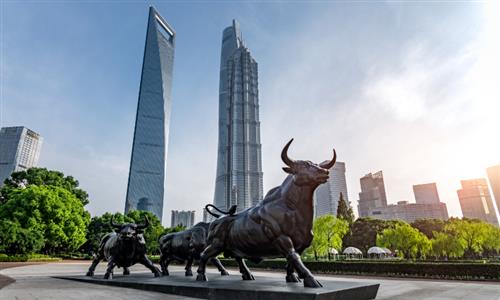2024 Yearender: China moves steadily toward building a financial powerhouse in 2024, boosting support for real economy
Further reform offers support to economy, benefits investors: analyst
Editor's Note:
Despite a complex and grim international environment, foreign financial institutions continued to briskly increase their investment in China in 2024, eyeing huge dividends brought about by the country's long term stable growth. At the critical moment for promoting high-quality growth, top meetings and a series of policies set the direction for the reform and opening-up in the financial industry. This article is one of a series looking back at China's economic work this year and sheds light on materializing the vision of building a financial powerhouse.

In 2024, China moves steadily toward the building of a nation with a strong financial sector, with the financial system providing more support to the real economy, financial regulation and risk prevention seeing marked improvement, and two-way opening-up making headway.
The financial sector is the lifeblood of a nation's economy and a crucial component of a country's core competitiveness. Under the leadership of the Communist Party of China (CPC), China firmly follows a path of financial development with Chinese characteristics and continues to promote the high-quality development of the financial sector, with further improvement seen in the comprehensive competitiveness of the country's financial sector.
Enhanced capability
In July, British magazine The Banker unveiled Top 1,000 World Banks, with China's four biggest banks - Industrial and Commercial Bank of China, China Construction Bank, Agricultural Bank of China and Bank of China - remaining in the top four positions for consecutive seven years. In total, China has six banks in the Top 10 list.
China has become a "large financial country" by now, with the total assets of the banking industry ranking No 1 globally, while having the world's second-largest stock market, bond market and insurance market, the Xinhua News Agency reported in September.
Dong Yun, director of the Research Center for International Political Economics of the National Institution for Finance and Development, attributed the steady progress of China's financial sector to the centralized and unified leadership of the CPC Central Committee over financial work.
"This year, the central government and financial government agencies have announced and implemented a series of financial polies to boost the high-quality development of the financial sector, unleashing greater development potential," Dong said.
The Government Work Report of the State Council, the cabinet, delivered at this year's two sessions in March noted that the country "will implement plans for the reform of the financial system," with stepped-up efforts to be made to "improve the system of financial regulation and raise our capacity for preventing and controlling financial risks."
"Improving monetary policy's transmission mechanism," "improving the financial sector regulatory system" and "promoting high-standard opening-up of the financial sector" … a resolution adopted at the Third Plenary Session of the 20th Central Committee of the Communist Party in mid-July made multiple forward-looking and systemic measures in the top-level design of deepening financial system reform.
The capital market is an important part of the financial industry. In April, the State Council, the country's cabinet, released a guideline on strengthening regulation, forestalling risks and promoting the high-quality development of the capital market. Focused on the goal of building a stronger financial sector, the third guideline document on the capital market from the State Council in two decades charted an encouraging blueprint for the high-quality development of the capital market.
Accelerating opening-up
Since US-based AllianceBernstein Holding obtained a license from Chinese financial regulator in the beginning of 2024 to run a wholly-owned mutual fund business in China, a group of major foreign financial institutions have stepped up operations in China.
Very recently, wholly foreign-owned Aspect Capital (China) Ltd has been successfully registered as a private equity fund manager with the Asset Management Association of China (AMAC), and Singapore-based DBS has completed the process to increase its stake in DBS Securities China to 91 percent, up from 51 percent.
"DBS has profoundly witnessed and participated in China's opening-up since its establishment of a representative office in Beijing in 1993. The move of increasing stakes in DBS Securities (China) is based on our confidence in China's economic prospects in the long run and the policy signal of continuous high-level opening-up," DBS China told the Global Times in a statement on Monday.
"Today, it is becoming increasingly easier for foreign financial institutions to conduct business in China amid steady reform and high-level opening-up in the country's financial industry," Dong said.
Opening-up remains essential for the high-quality development of China's capital market. Anchoring high-level institutional opening-up, China will continue to coordinate development and safety of the market, and firmly deepen the opening-up of the capital market to facilitate cross-border investment and financing, Wu Qing, chairman of the China Securities Regulatory Commission, said in November at the third Global Financial Leaders' Investment Summit held in Hong Kong.
"We warmly welcome global investors to seize the opportunity to invest more actively in Hong Kong and Chinese mainland markets and better share the fruits of China's high-quality economic development," Wu noted.
Positive outlook
Looking ahead to 2025, multiple foreign financial institutions are generally positive about China's capital market development, and predict opportunities in fields such as financial technology, domestic consumption, new energy development and advanced manufacturing.
"We expect MSCI China/CSI300 to rally by 15 percent and 20 percent, respectively, in 2025," Kinger Lau, chief China equity strategist at Goldman Sachs, said in the investment bank's 2025 China equity outlook.
"Generally low investor positioning points to a favorable risk/reward for Chinese equities, underpinning our continued 'Overweight' recommendation for both China A- and H-shares," Lau said.
Commenting on the trend of global diversification and the role China plays in a globally diversified portfolio, Barry Gill, head of Investments at UBS Asset Management recently told Global Times: "China is my top pick. It is the cheapest stock market that I can see globally. It has the most potential to surprise investors on a number of fronts, whether it's policy-wise or the capital allocation decisions that the companies are making."
UBS Securities' China stocks strategist, Meng Lei predicted more opportunities in fields like electronics, home appliances and more.
Along with the implementation of incremental policies to support the development of the capital market and increasing expectations for macro-economic improvement, China's A-share market saw increasing vitality.
According to data from information provider Wind, the turnover on the Shanghai and Shenzhen stock exchanges exceeded 1 trillion yuan for the 56th consecutive trading day as of Wednesday. Over the period, the Shanghai Composite Index rose by an accumulative 23 percent, and the Shenzhen Component Index up by 31 percent and the Nasdaq-like ChiNext Index up by 44 percent.
The Central Economic Work Conference held in Beijing from December 11 to 12 stressed the need to build a multi-layered financial system, noting that China should nurture "patient capital" and attract greater social capital participation in the venture capital.
"Currently, deepening comprehensive reform of the financing sector in China's capital market is of profound significance," Yang Delong, chief economist at Shenzhen-based First Seafront Fund, told the Global Times.
The direction of China's capital market reform will attach importance to both financing and investment, and will provide support to the growth of the real economy, while enabling the vast investors to obtain more gains and sharing China's economic development achievements, Yang said.
Dong said that main tasks for China's financial sector in 2025 will be deepening the reform of the financial system, especially the capital market, to attract more medium to long-term capital to the market to boost its high-quality development.
Despite a complex and grim international environment, foreign financial institutions continued to briskly increase their investment in China in 2024, eyeing huge dividends brought about by the country's long term stable growth. At the critical moment for promoting high-quality growth, top meetings and a series of policies set the direction for the reform and opening-up in the financial industry. This article is one of a series looking back at China's economic work this year and sheds light on materializing the vision of building a financial powerhouse.

A view of the Lujiazui area in Shanghai Photo: VCG
In 2024, China moves steadily toward the building of a nation with a strong financial sector, with the financial system providing more support to the real economy, financial regulation and risk prevention seeing marked improvement, and two-way opening-up making headway.
The financial sector is the lifeblood of a nation's economy and a crucial component of a country's core competitiveness. Under the leadership of the Communist Party of China (CPC), China firmly follows a path of financial development with Chinese characteristics and continues to promote the high-quality development of the financial sector, with further improvement seen in the comprehensive competitiveness of the country's financial sector.
Enhanced capability
In July, British magazine The Banker unveiled Top 1,000 World Banks, with China's four biggest banks - Industrial and Commercial Bank of China, China Construction Bank, Agricultural Bank of China and Bank of China - remaining in the top four positions for consecutive seven years. In total, China has six banks in the Top 10 list.
China has become a "large financial country" by now, with the total assets of the banking industry ranking No 1 globally, while having the world's second-largest stock market, bond market and insurance market, the Xinhua News Agency reported in September.
Dong Yun, director of the Research Center for International Political Economics of the National Institution for Finance and Development, attributed the steady progress of China's financial sector to the centralized and unified leadership of the CPC Central Committee over financial work.
"This year, the central government and financial government agencies have announced and implemented a series of financial polies to boost the high-quality development of the financial sector, unleashing greater development potential," Dong said.
The Government Work Report of the State Council, the cabinet, delivered at this year's two sessions in March noted that the country "will implement plans for the reform of the financial system," with stepped-up efforts to be made to "improve the system of financial regulation and raise our capacity for preventing and controlling financial risks."
"Improving monetary policy's transmission mechanism," "improving the financial sector regulatory system" and "promoting high-standard opening-up of the financial sector" … a resolution adopted at the Third Plenary Session of the 20th Central Committee of the Communist Party in mid-July made multiple forward-looking and systemic measures in the top-level design of deepening financial system reform.
The capital market is an important part of the financial industry. In April, the State Council, the country's cabinet, released a guideline on strengthening regulation, forestalling risks and promoting the high-quality development of the capital market. Focused on the goal of building a stronger financial sector, the third guideline document on the capital market from the State Council in two decades charted an encouraging blueprint for the high-quality development of the capital market.
Accelerating opening-up
Since US-based AllianceBernstein Holding obtained a license from Chinese financial regulator in the beginning of 2024 to run a wholly-owned mutual fund business in China, a group of major foreign financial institutions have stepped up operations in China.
Very recently, wholly foreign-owned Aspect Capital (China) Ltd has been successfully registered as a private equity fund manager with the Asset Management Association of China (AMAC), and Singapore-based DBS has completed the process to increase its stake in DBS Securities China to 91 percent, up from 51 percent.
"DBS has profoundly witnessed and participated in China's opening-up since its establishment of a representative office in Beijing in 1993. The move of increasing stakes in DBS Securities (China) is based on our confidence in China's economic prospects in the long run and the policy signal of continuous high-level opening-up," DBS China told the Global Times in a statement on Monday.
"Today, it is becoming increasingly easier for foreign financial institutions to conduct business in China amid steady reform and high-level opening-up in the country's financial industry," Dong said.
Opening-up remains essential for the high-quality development of China's capital market. Anchoring high-level institutional opening-up, China will continue to coordinate development and safety of the market, and firmly deepen the opening-up of the capital market to facilitate cross-border investment and financing, Wu Qing, chairman of the China Securities Regulatory Commission, said in November at the third Global Financial Leaders' Investment Summit held in Hong Kong.
"We warmly welcome global investors to seize the opportunity to invest more actively in Hong Kong and Chinese mainland markets and better share the fruits of China's high-quality economic development," Wu noted.
Positive outlook
Looking ahead to 2025, multiple foreign financial institutions are generally positive about China's capital market development, and predict opportunities in fields such as financial technology, domestic consumption, new energy development and advanced manufacturing.
"We expect MSCI China/CSI300 to rally by 15 percent and 20 percent, respectively, in 2025," Kinger Lau, chief China equity strategist at Goldman Sachs, said in the investment bank's 2025 China equity outlook.
"Generally low investor positioning points to a favorable risk/reward for Chinese equities, underpinning our continued 'Overweight' recommendation for both China A- and H-shares," Lau said.
Commenting on the trend of global diversification and the role China plays in a globally diversified portfolio, Barry Gill, head of Investments at UBS Asset Management recently told Global Times: "China is my top pick. It is the cheapest stock market that I can see globally. It has the most potential to surprise investors on a number of fronts, whether it's policy-wise or the capital allocation decisions that the companies are making."
UBS Securities' China stocks strategist, Meng Lei predicted more opportunities in fields like electronics, home appliances and more.
Along with the implementation of incremental policies to support the development of the capital market and increasing expectations for macro-economic improvement, China's A-share market saw increasing vitality.
According to data from information provider Wind, the turnover on the Shanghai and Shenzhen stock exchanges exceeded 1 trillion yuan for the 56th consecutive trading day as of Wednesday. Over the period, the Shanghai Composite Index rose by an accumulative 23 percent, and the Shenzhen Component Index up by 31 percent and the Nasdaq-like ChiNext Index up by 44 percent.
The Central Economic Work Conference held in Beijing from December 11 to 12 stressed the need to build a multi-layered financial system, noting that China should nurture "patient capital" and attract greater social capital participation in the venture capital.
"Currently, deepening comprehensive reform of the financing sector in China's capital market is of profound significance," Yang Delong, chief economist at Shenzhen-based First Seafront Fund, told the Global Times.
The direction of China's capital market reform will attach importance to both financing and investment, and will provide support to the growth of the real economy, while enabling the vast investors to obtain more gains and sharing China's economic development achievements, Yang said.
Dong said that main tasks for China's financial sector in 2025 will be deepening the reform of the financial system, especially the capital market, to attract more medium to long-term capital to the market to boost its high-quality development.



